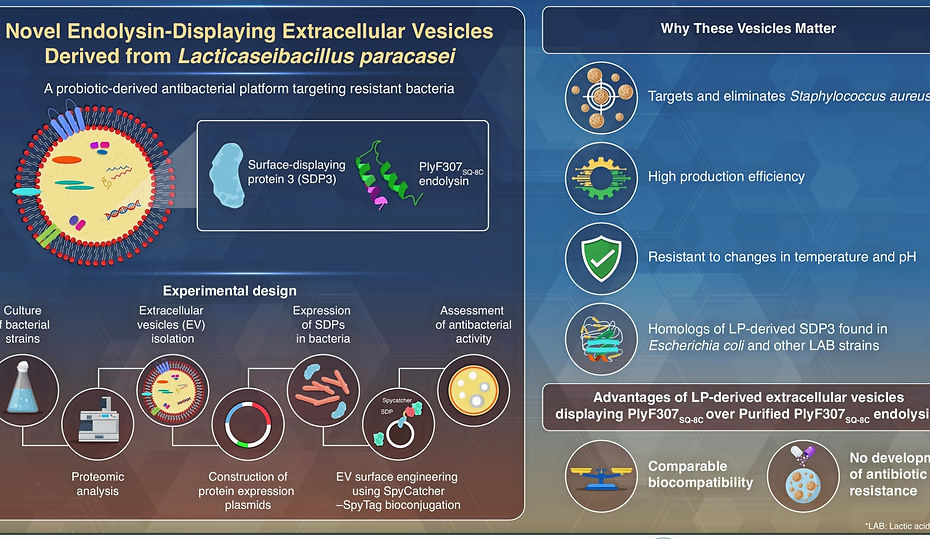
Research interests
Bacteria are ubiquitous microscopic organisms capable of rapid growth. While beneficial strains like lactic acid bacteria (LAB) promote gut health and food preservation, pathogenic bacteria such as Escherichia coli and Staphylococcus aureus can cause severe infections. These harmful microbes produce toxins and enzymes that compromise health and, increasingly, show resistance to conventional antibiotics.
In recent years, scientists have explored alternative approaches to tackle pathogenic bacteria. Among them, endolysins—enzymes that degrade bacterial cell walls—have emerged as potent tools. These proteins, often derived from bacteriophages or engineered microbes, offer specificity in targeting pathogens. However, their widespread use is limited by challenges such as high production costs, instability during storage or circulation, and susceptibility to enzymatic degradation.
To address this research gap, we have turned our attention to extracellular vesicles (EVs)-membrane-bound nanoparticles released by cells that transport biologically active molecules like proteins or nucleic acids. We engineered EVs derived from LAB to carry pathogen-specific endolysins on their surface. The research outlines the discovery and application of a novel surface-displaying protein found on EVs from Lacticaseibacillus paracasei.
“Engineered EVs derived from LAB can be produced on a large-scale and reduces the need for expensive protein purification technologies,” comments Prof. Kim. “In 5 to 10 years, this research could help reshape the way we treat infections, preserve food, and manufacture biological therapies—shifting away from antibiotics toward safe, smart, and sustainable bioengineered alternatives”.
Taken together, the identification of LP-SDP3 protein and its use in developing a novel, safe, and efficient EV-based platform can transform the landscape of antibacterial therapies.
The key subjects on above topics
Major topics of RNBL
-
Regulation of antibiotic resistance: identification of novel antibacterial target genes and seeking for the combinatorial materials to improve the efficacy of current last-resort antibiotics
-
Applications of the newly identified knowledge to both the diagnosis and treatment of specific antibiotic resistant superbugs by new-concept antibacterials.
-
Identification and development of new biologically non-toxic materials in killing G(-) and G(+) bacteria
-
Development of new concept antibiotics and vaccines against infectious diseases
-
Biogenesis of Outermembrane vesicles and their applications in the vaccine development
-
Mechanisms that control the expression and decay of cellular RNAs by environmental stresses
-
Unraveling the role of bacterial and eukaryotic small noncoding RNAs in infectious or human diseases
-
Synthesis of new nanomaterial platforms
-
Design new vaccine production systems for infectious diseases
-
Chemical screening for functional molecules against infectious diseases
Keywords
Ribonuclease, Small noncoding RNA, Pathogen, Black phosphorus, Nanoantibiotics, Nanoparticles, Nanocomposites, Antibiotic resistance, Trans-acting regulators, Biofilm, Outer membrane Vesicles, Proteomics, RNomics, Operon, RNA decay

